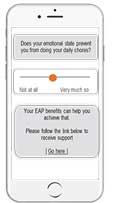Author: Dr. Shoba Subramanian, Medical Director, Europe, UnitedHealthcare Global
With the COVID-19 pandemic at the moment easing in many countries across the globe, some businesses may be returning to a more normal routine. An increasing number have begun the long-awaited return to the office and business travel, with employees taking part in more in-person meetings and workplace gatherings.
This return may bring with it additional stress. In fact, a recent survey found that an estimated 37% of people are finding work more stressful now than before the pandemic, potentially resulting in increased alcohol use.1
From reduced productivity to missing a day of work altogether, workplace drinking can be an enormous cost for businesses.2 With that in mind, employers can play a crucial role in helping reduce alcohol intake by employees inside and outside the workplace.
According to the World Health Organization, worldwide, 3 million deaths every year result from harmful use of alcohol, and it is a causal factor in more than 200 disease and injury conditions.3 There are several signs that may indicate an employee is struggling with alcohol use. Frequent tardiness, excessive use of sick leave and unexplained or unauthorised absences are just a few signs employers should look for.4 If you notice some of these behaviour patterns, it’s important to make colleagues aware of any available resources or programmes.
Here are a few strategies employers can consider to help improve employee well-being and encourage a healthier relationship with alcohol.
Strike a balance
Social events are a great way to boost morale and strengthen bonds across the workplace. These events can often include both alcoholic and non-alcoholic drinks. However, it is important that every business has its alcohol workplace policies in place to avoid potential confusion, such as guidance around drinking at lunchtime or with clients. Codifying these policies into a place where employees can access them, such as in a handbook or on a company internal website, is a first step to help ensure every employee understands what is required of them.
Provide free and confidential support
 Employers should also provide access to Employee Assistance Programmes (EAPs) and other types of support to help people who may struggle with their alcohol use. Support around alcohol use is crucial to take a proactive approach to health and well-being in the workplace. Enabling access to care professionals and consultations (if needed) can help build a strong and supportive culture.
Employers should also provide access to Employee Assistance Programmes (EAPs) and other types of support to help people who may struggle with their alcohol use. Support around alcohol use is crucial to take a proactive approach to health and well-being in the workplace. Enabling access to care professionals and consultations (if needed) can help build a strong and supportive culture.
For instance, through UnitedHealthcare Global, employers can provide an International Employee Assistance Program (IEAP) and LiveWell tool to direct eligible employees to a variety of resources designed to support mental health, including for depression, anxiety and stress, and substance abuse.5
Host alcohol-free social events
More often than not, there may be a flow of alcohol during workplace social events. Gathering with colleagues is a fun opportunity to destress and further colleague relationships.
As part of that effort, employers can make a commitment to diversify the type of social events that are organised. Instead of going to a bar, arranging alternative forms of social activities is a great way to boost morale and improve employee well-being at the same time. Stress relieving activities, from pottery making to group cooking classes to bowling, may offer fun alternatives to workplace drinking.

For support, UnitedHealthcare Global’s My Wellbeing app from Optum provides several alcohol-free activities to keep employees engaged. The app’s gaming activities provide an opportunity for social interactions with co-workers without the need for alcohol. All these steps may improve productivity, reduce stress levels and foster a positive workplace culture.
Shake up office ‘happy hours’
Happy hour is a long-standing tradition in many workplaces. It is estimated that happy hour can drive employee happiness by as much as 66%.6 When it comes to employee retention and productivity, providing these kinds of perks can make a huge difference.
However, this doesn’t mean that your business must offer free drinks every week. Instead of providing alcohol in the office, offering alcohol-free drinks or low-alcohol beer can have a similar impact on your workplace morale. Employees often feel obliged to drink if alcohol is supplied during a work-related event, so shaking up happy hour with alcohol-free alternatives can reduce consumption. Other alternatives for happy hour could include serving gourmet snacks and fruit, or even arranging a fun activity for entertainment to encourage employees to come together for a social event.
Take part in global initiatives
Encouraging your workplace to take part in initiatives such as Alcohol Awareness Week, which takes place each March, can help raise employee understanding of alcohol-related issues. Instead of being anti-alcohol, the campaign is focused on helping improve people’s relationship with alcohol.7
Employers can create initiatives encouraging employees not to drink during this week. Employers can also promote the benefits of reducing alcohol consumption through their internal initiatives and webinars. Engaging openly and positively with the subject is a great opportunity to raise awareness of any potential issues inside the workplace.
Ultimately, it’s all about striking a balance and encouraging a healthy relationship with alcohol. Whether you’re providing an alcohol-free happy hour, training courses for your employees, or initiatives to target stress, these are fantastic first steps to create a comfortable and positive workplace environment.
------------------------------------------------------------------------------------------------------------------------------------------------------------------------------------------------------------------------
Resources:
1: https://www.reassured.co.uk/feeling-stressed/
2: https://alcoholchange.org.uk/alcohol-facts/fact-sheets/alcohol-in-the-workplace
3: Alcohol (who.int)
4: https://www.reassured.co.uk/feeling-stressed/
5: https://www.opm.gov/policy-data-oversight/worklife/reference-materials/alcoholism-in-the-workplace-a-handbook-for-supervisors/
6: https://uhcglobal.com/en/resources/member-resources/international-employee-assistance-program
7: https://www.inc.com/heather-wilde/the-surprising-way-anheuser-busch-wants-to-help-your-employee-retention.html
8: https://alcoholchange.org.uk/about-us
